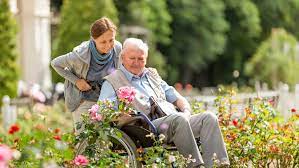Visiting a care home can be a rewarding experience for both you and the residents. By taking the time to prepare for your visit, you can ensure that it is a positive experience for all involved.
What to Do First
When you first arrive, take a few moments to orientate yourself to the surroundings. This will help you feel more comfortable and relaxed, which will, in turn, put the senior at ease.
You should introduce yourself to the staff. Let them know who you are and why you’re there. For the most part, staff at care facilities like fairviewcare.com are used to meeting with family members and putting them at ease, and it can be helpful to meet with them to understand more about your friend or relative’s condition. Doing this will help them to make sure that your visit runs smoothly and that you have everything you need.
Visiting Your Friend or Relative
When you’re ready, go and introduce yourself to the person you are there to visit; your friend or relative.
Talk to them about their day, their interests, and anything else that comes up. Remember that some of the residents may be living with dementia, so be patient and understanding if they struggle to follow the conversation or keep track of what’s going on.
Once you’ve had a chance to chat, see if there’s anything else you can do to help out. This could be anything from joining in with an activity to taking them for a walk outside. If you’re not sure what to do, just ask the staff – they’ll be happy to give you some ideas.
What to Bring with You
If you are thinking of making a visit to a care home, there are a few things you can bring to make the experience more pleasant for both you and the residents.
Here are a few ideas:
- A small gift – You don’t have to bring anything expensive, but bringing a card, some flowers or a treat can let the resident know that you are thinking of them.
- A conversation starter – If you’re not sure what to talk about, try bringing along some pictures or mementos from your life. This can help get the conversation going, and it’s a chance for your friend or relative to share their own stories.
- An open mind – Approach each resident with an open mind and be prepared to have your assumptions challenged.
What to Do If They Are Having a Bad Day
There are a number of things that you can do if you find yourself in this situation. The most important thing is to stay calm and try to be understanding. It is also important to remember that each person is different and will react differently to different situations.
Try to assess the situation and see if there is anything that you can do to help. If the senior is angry or upset, try to remain calm and avoid getting into an argument. If the situation seems to be getting out of hand, don’t hesitate to ask for help from the staff.








